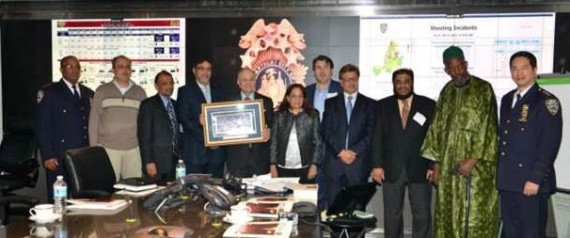
NYPD Commissioner Ray Kelly received an award this month from a source that may seem unlikely: a group of Muslim community leaders.
"The Muslim community appears to be softening its stance toward Ray Kelly as he walks out the door," one tabloid crowed, suggesting that a Muslim council of 10 members hand-picked by the NYPD represented Muslim New Yorkers in all their diversity. But the meaning of the award granted Dec. 9 by the Muslim Advisory Council, set up by the NYPD in 2012, is very much up for debate.
New York's hundreds of thousands of Muslims come from backgrounds rich and poor, from lands far away to uptown Harlem. The Muslim Advisory Council award -- derided by the New York chapter of the Council on American-Islam Relations as a "cheap public relations stunt" -- highlights the diverse reactions to revelations of police surveillance of Muslims. Some Muslims have retreated into silent distrust. Others have expressed outrage. A third group sees a different path -- trying to engage.
"The idea of the council is great," said Dr. Ahmed Jaber, a retired obstetrician and gynecologist who used to sit on the Muslim Advisory Council. "We were discussing it years before Kelly. We wanted that relationship with the higher authority."
But for Jaber, who said he was one of three council members who have resigned since the group's first meeting in July 2012, idea and reality never really met on the council. The group has been granted unusually rich access to the head of the nation's largest police force, meeting with him at least three times. In those meetings, however, Jaber said the commissioner rarely strayed from NYPD public talking points about the surveillance of Muslims.
"I basically asked him whether he's going to continue with this program," Jaber said, after a deposition of a police official in a lawsuit against the department showed that widespread mapping of Muslims had generated no leads. "He said, 'I'm following leads and it's legal.'"
"There wasn't a sincere willingness on the part of the top brass to listen to and really hear out the concerns of the surveillance issues," said another source, familiar with Muslim Advisory Council internal discussions. "Instead there was a fair degree of defensiveness."
Jaber resigned in August, furious over the revelation that the NYPD had proposed infiltrating the board of another organization he sat on, the Arab-American Association of New York.
Other members of the Muslim Advisory Council, however, have continued to try to bend Kelly's ear, even as Associated Press revelations about the department's extensive surveillance of Muslims dripped out.
Imam Tahir Kukiqi, of the Albanian Islamic Cultural Center on Staten Island, said the council has served as a useful way for the community to engage the NYPD on matters both mundane and profound.
Kukiqi said he was stung last year when an "Albanian Locations of Concern" report produced by the NYPD in 2006 listed his cultural center. He saw joining the council as an opportunity to clear up "misconceptions" and said it has been a useful forum for everything from complaining about parking enforcement -- a perennial concern -- to receiving information about hate crimes against Muslims.
The award to Kelly, Kukiqi said, was the council's idea. It was given because "the NYPD has the best record of public safety in the whole entire nation, and a great deal of that effort has been done by the leadership of Mr. Kelly."

For the New York chapter of the Council on American-Islamic Relations, an advocacy group, the award was something very different: a "cheap public relations stunt."
"While there may be a tiny minority of Muslims who do support Ray Kelly's actions -- those who are perhaps unaware of the damage done by NYPD predatory policing -- the vast majority of Muslim New Yorkers do not support or applaud his ineffective and biased policies," Ryan Mahoney, president of the group's New York chapter, said in a statement.
At almost the same time it was giving Kelly his award, the advisory council submitted a Dec. 1 memo highlighting controversies that have marred the relations of Kelly's police department with Muslims: a "radicalization" study panned by civil liberties groups, an Islamophobic screed featuring an interview with Kelly that was screened as a training video for NYPD cadets, and "terrorism enterprise investigations" that have listened in on imams as they deliver sermons.
Those issues, the council wrote in its memo, have "strained the relationship between the Muslim Community and the NYPD" and "served to erode some of the goodwill the NYPD has fostered by other means."
But the memo also called the NYPD's efforts to build relationships with communities a "model of cooperation," NYPD Deputy Commissioner John McCarthy noted in a statement to HuffPost.
"Those efforts, including forming the Muslim Advisory Council, are meant to clarify the very type of misunderstandings to which the document refers," McCarthy said. "To that end, we strongly value the council’s input and look forward to continuing the relationship."
The advisory council memo points to a police department future under Bill Bratton, who has been tapped by Mayor-elect Bill De Blasio to serve as the next NYPD commissioner. While some Muslim groups, including national legal organization Muslim Advocates, have expressed concern over Bratton's history with Muslims during his leadership of the Los Angeles Police Department, most seem to waiting to see whether he can mend relations with New York Muslims.
Jaber said even though he no longer sits on the advisory council, he hopes it will prove its use under the next police commissioner.
"We are looking forward to having a normal relationship between the NYPD and all communities, and we are hoping for the surveillance program to end," Jaber said. "That's our aim."

